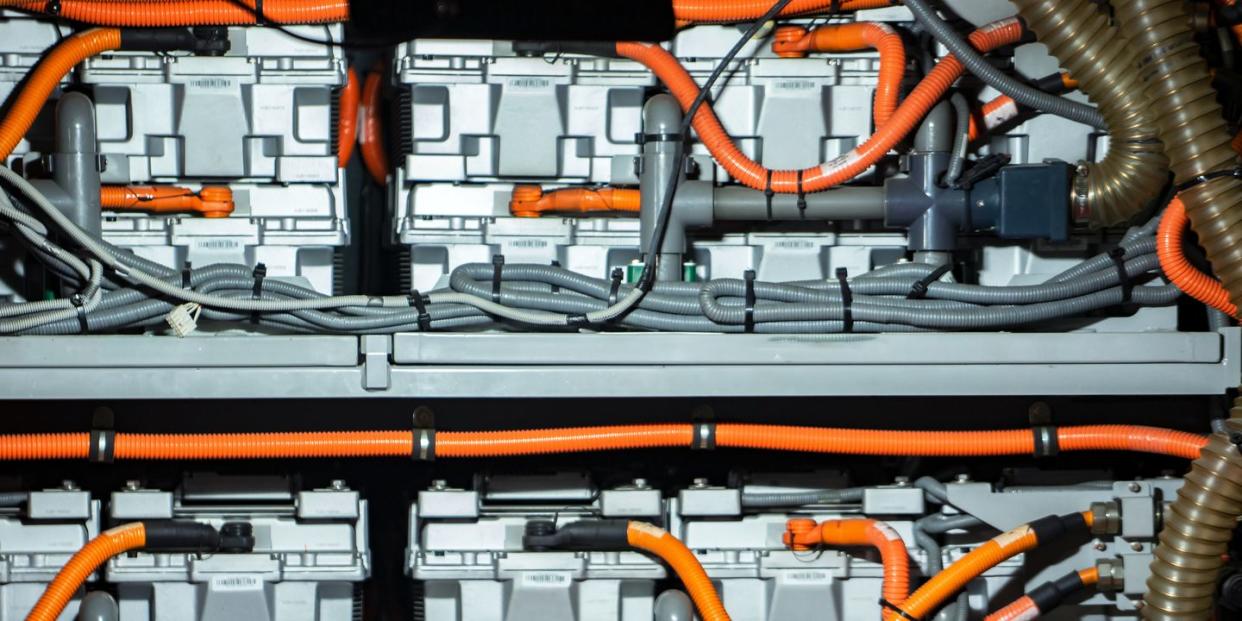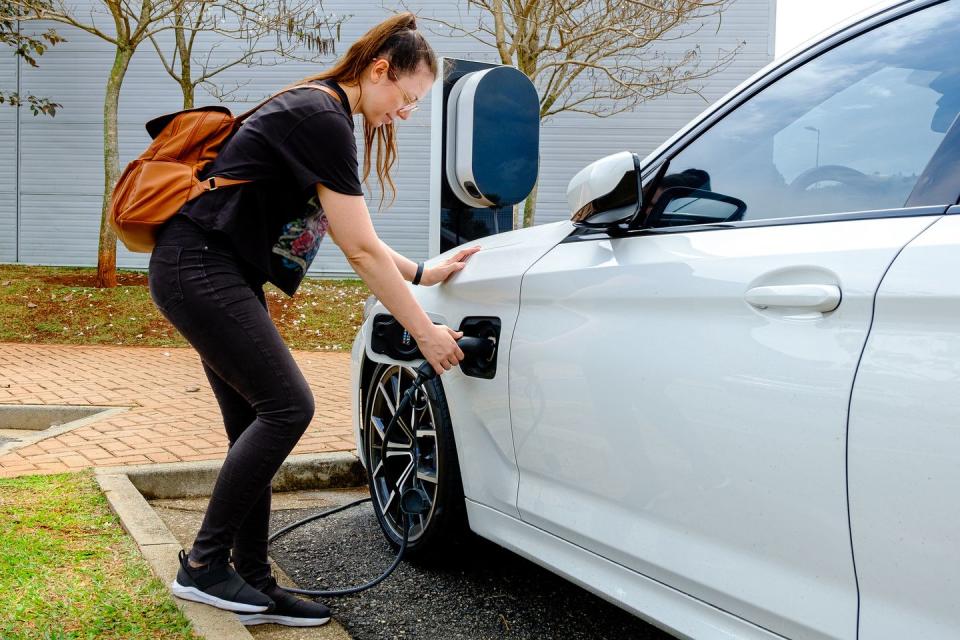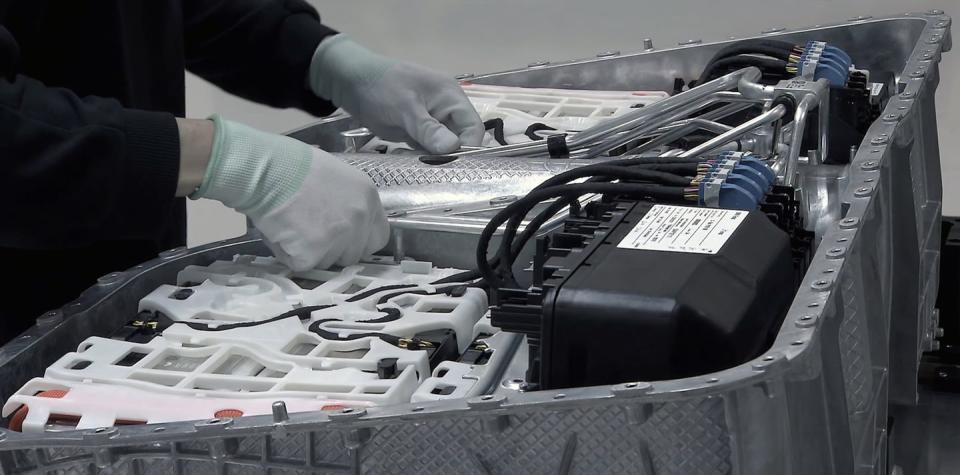How Much Do EV Batteries Cost?

Just like the batteries found in your smartphone, tablet, and laptop, electric car batteries must charge to recover lost energy. The battery capacity, range, and energy density vary from vehicle to vehicle, and with the size of the battery pack. Electric cars are given a range estimate when new, which is the number of miles they can travel on a single charge.
Over time, however, battery packs can lose some of their initial magic and may not be able to recharge to the same level as they could when new. Battery capacities can drop with use, especially if the car is driven hard and is not well maintained. Unlike the battery in your cellphone or laptop, the lithium ion batteries in your electric car can't be swapped out with a quick trip to the electronics store. When your battery life dips, you may in for a shocking time at your next trip to the mechanic.
Electric Car Battery Cost
The good news here is that most manufacturers provide long warranties on the battery in your electric vehicle, up to 100,000 miles and 10 years in some cases. Electric vehicles typically cost less to maintain over time than a car with a gasoline engine, sweetening the experience for an EV owner. There's further good news in the fact that automakers and battery manufacturers are ramping up production of cars and batteries, which means that we will eventually see price parity between EVs and gas vehicles. In the meantime, though, we're all stuck paying more for electric vehicles, even with a government tax credit and other rebates.

Even though prices are moving in the right direction, electric car battery replacement cost averages still land at a much higher rate than most expect. In 2016, studies found that the cost of a typical EV battery replacement could reach $10,000 or more, which is on par with the cost to replace a gas engine in traditional cars. Electric car batteries can be hard to source from anyone other than a dealer, and the time it takes to install and calibrate the batteries means that prices are going to remain steep for some time. The price per kilowatt hour is expected to fall by the end of the decade, but that can be little consolation to someone needing an electric car battery today.
There are several reasons for this cost. Electric car batteries are much larger than those found in traditional consumer goods, so there's more material to source and contain. Batteries are also in high demand as electric vehicle sales grow rapidly. Batteries can also be more expensive because they are designed for efficient energy consumption. The lithium ion battery packs in a standard EV are developed to deliver long range with little maintenance and special charging capabilities such as DC fast charging. Battery power, installation costs, charging features, and range all vary from car to car.
Solid State Batteries
The batteries in EVs today are traditional lithium ion units, which means there is a liquid inside. These batteries are heavy, and don't have the density needed to offer true breakthrough range numbers. Solid state batteries promise to revolutionize the EV battery pack with a far more energy dense battery pack that is lighter, more compact, and safer. Since there is no dangerous liquid inside, solid state units promise a reduced risk of fire and better energy delivery. Many automakers are hard at work on the technology, but the price/cost threshold hasn't been crossed. Solid state battery models are hard to develop and so expensive to produce that it will likely be years before the tech makes its way into mainstream cars.
Overview of Electric Car Charging Costs
Beyond the purchase price of a new EV, there are operating costs. Just like driving a gas car means stopping to fill up with fuel, driving an EV means charging the batteries.
If you own an EV and own your home, you might consider installing a home charging station. This can cost as little as a few hundred dollars, but can also cost quite a bit more than that for the most elaborate and robust systems with accompanying EV charging equipment. The cost to charge an electric car at home is likely less than you think.

How Much Does it Cost to Charge an Electric Car?
COST OF ELECTRICITY
The Alternative Fuels Data Center uses an example of charging an electric vehicle with a 66 kilowatt hour (kWh) battery from empty. It assumes that electricity costs $0.13 per kilowatt-hour, so the cost to charge a vehicle with a 200-mile range would be around $9.
Electricity rates vary from place to place and can be quite a bit different than this example, depending on the location, but it’s a good indicator that charging electric vehicles is cheaper than filling a gas tank.
ELECTRICITY COST VS. GAS
As of the time of this article, the national average for regular gas is $4.857 per gallon. If we use a 2018 Honda Civic as our example, its 12.4-gallon tank would cost about $60.23 to fill. Of course, the Honda can achieve up to 42 miles per gallon, so in ideal conditions its full tank of fuel would help it travel a considerable distance further than an EV.
Even doubling the cost of electricity would still mean the price of charging an EV is less than a fuel fill up. Like the recharge costs that come along with owning an EV, gasoline costs fluctuate from time to time.
ALTERNATIVE SOURCES
The dollar amount of gas costs will likely remain much higher than electricity over time. Everyone from the U.S. Department of Energy to your local utility company is working on alternative energy sources that will lower recharging costs and hopefully slow the pace of climate change over time.
Federal Tax Credits May Apply
The United States government offers a one-time tax credit of up to $7500 to buyers of eligible electric and plug-in hybrid vehicles. The credit applies to vehicles that have sold fewer than 200,000 units, which means that some that have been around for a while are no longer eligible for the credit.
It’s important to remember that this is not a rebate and note that this does not mean you will receive a check in the mail at the end of the year. The $7500 credit applies to your annual tax burden, so if you owe less than $7500, you will not receive the entire credit amount.
State Tax Credits Can Help Even More
In addition to federal tax incentives, many states offer a similar credit. Maine, for example, offers an instant rebate of up to $2000 for new EVs. The money can truly make a difference in the purchase price of an EV, as the Efficiency Maine website points out. The amount and eligibility requirements can vary from state to state, so it’s important to check with your state to be sure of what you’re able to claim.
So, How Much Does It Cost to Own an Electric Vehicle Over Time?

MAINTENANCE
Beyond the question of charging, EV maintenance and ownership costs are big issues for those unfamiliar with the space. Unlike a gas-powered car, EVs don’t have hundreds of complex mechanical moving parts, which means common repair items like water pumps and air filters don’t need to be replaced. EVs also tend to chew through brakes slower than their gas powered counterparts because of regenerative braking, which uses the electric motor as a generator and slows the car.
On the flip side, some electric vehicle owners report burning through tires at an increased rate, due to the instant torque and exhilarating acceleration that an electric car offers.
DEPRECIATION
Depreciation and longevity should also be on the minds of electric car owners. Electric vehicles tend to cost more than their gas-powered counterparts, but over time they have shown a tendency to lose value (depreciate) more quickly. Some electric cars have lost as much as 70 percent of their value over a five-year period.
Of course, keeping any vehicle for an extended period of time is the best way around the cost of depreciation.
How long do EVs last?
The battery in an electric car starts to break down after a while, just like any other electrical component. Over time, the batteries begin to lose capacity and don’t hold as much of a charge, which can greatly reduce range. Cars are only useful if they can travel their advertised range, so an electric car with a bad battery is nearly worthless.
Automakers issue warranties for the batteries and electrical components in EVs, just like they would for any other vehicle. In many cases, these warranties extend to 10 years or 100,000 miles or more, which means that the battery can be repaired or replaced if it breaks within that time period.
What are the pros of owning an electric vehicle?
REDUCED MAINTENANCE
It’s true that gas vehicles are usually less expensive and easier to refuel, but there are several benefits to owning an EV that have nothing to do with costs. One of the biggest pros is the reduced need for regular maintenance. There are no oil changes, no mechanical components to break underhood, no exhaust system, and the life of other components such as brakes can be extended. Many people report that driving an electric car is more relaxing than a gas vehicle, because of the lack of engine noise.

MORE PERFORMANCE
Many electric models offer significant performance benefits over gas vehicles as well. This applies not only to intended high-performance cars, but even to everyday commuter vehicles. The immediate torque and acceleration can make electric cars exhilarating to drive, and make them quicker than most people expect, depending on driving habits.
TAX INCENTIVES
There may also be tax credits available, depending on the electric car you opt for. The United States government offers a one-time tax credit of up to $7500 to buyers of eligible electric cars—and various states offer tax credits on select models, too—which lowers the effective cost of the purchase.
All of that, and we haven’t even mentioned the complete reduction of greenhouse gas emissions in everyday driving and the fact that gas prices fluctuate wildly. Fuel costs are a big motivator for many buyers.
What are the cons of electric cars?
ACCESS TO CHARGING
There are a few downsides that might not be immediately apparent when you are standing on the dealer's lot trying to make a car purchase. Depending on your location, you may or may not have ready access to charging stations. This is especially true for people who live in apartment buildings or those who rent, as it can be impossible to install a home charging system.

CHARGING
You may also find that electric cars take too long to charge, even if there is a charging station nearby. Unlike filling up a gas tank, which can take a few minutes, most electric vehicles take much longer to recover a sizable portion of their range. This can make road trips impractical for many, as the requirement to stop and charge for half an hour or more can turn a simple trip into a long, painful one.
COST TO BUY
Last, there is the issue of purchase cost. Electric cars, no matter the type, size, or technology, are usually more expensive than comparable gas vehicles.

